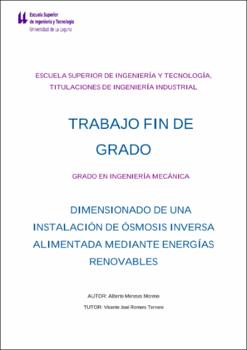Dimensionado de una instalación de ósmosis inversa alimentada mediante energías renovables.
Author
Meneses Moreno, AlbertoDate
2019Abstract
The objective of this project could be classified in two significant tracks: the academic
and the professional.
When defining the academic objective, it is convenient to cite the description found in
the teaching guide of the course: “The objective of the End-of-degree project (TFG) is to
develop in an cohesive matter the different competences of the diploma and to evaluate its
acquisition by the student and it will be developed by the modality of an specific organization”.
This can be understood, in a summarized form, as the passing of the End-of-degree
course (TFG). As a consequence, the degree of Industrial Engineering of the University of La
Laguna is obtained, after acquiring the necessary knowledge and capabilities for the completion
of the work in an autonomous and correct way.
On the other hand, if the professional aspect is to be described, the specific objective of
this projects is the study of a desalination system fed by renewables energies. The dimensions
of a reverse osmosis medium-sized desalination plant (1850 m3
/day) will be drawn. The water
production will be destined to the agriculture sector. The hydraulic needs of 25,6 hectares of
farmland will be covered in the locality of Alajeró (in the island of La Gomera). Water will be
distributed up to a bound of 1268 meters over the sea level. In this way, a reduction of the
potable water, used for the same objective, will be reduced.
Moreover, it is aimed to produce the least environmental impact as possible. Because of
this, the energy supply of the desalination plant is provided using renewable energies. The
installation of a wind powered generator, able to cope with the annual demand of the plant is
studied. Nevertheless, the instability of a wind resource will be considered. Consequently, a
part of the electricity supply will be supplied by the local network.
Finally, an analysis of the economic cost and the environmental impact will be
performed. The objective, on the one hand, is to assess the economic viability of the project,
and, on the other hand, to study the reached reduction of the emission of polluting gases and
the saving of fossil fuels thanks to the implementation of the renewable energies program.





